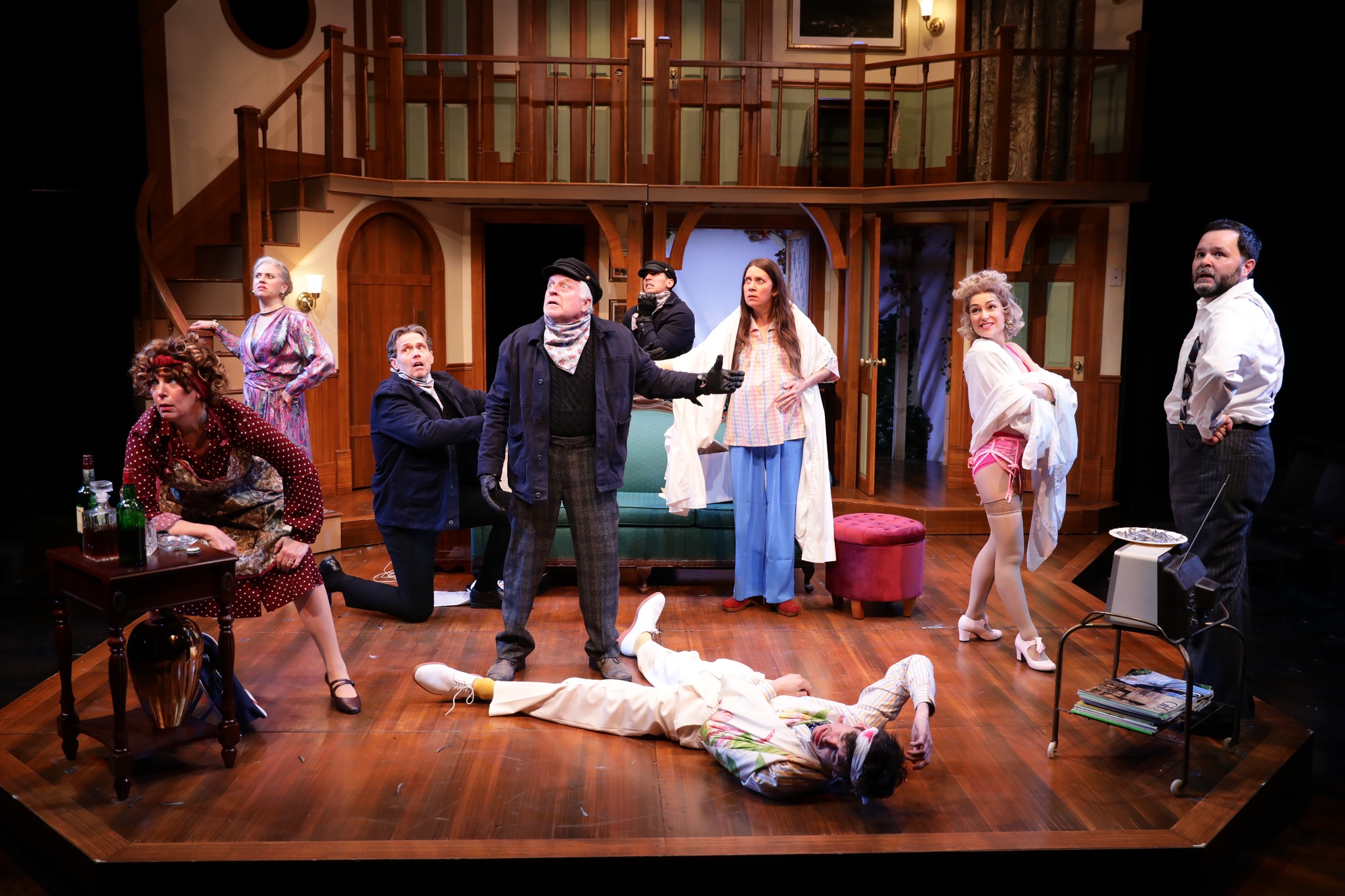
The cast. Photo by Mark S Howard.
Presented by Lyric Stage Boston
By Michael Frayn
Directed by Ilyse Robbins
Sound Design – Andrew Duncan Will
Scenic Design – Erik D. Diaz
Costume Design – Seth Bodie
Lighting Design – SeifAllah Salotto-Cristobal
Props Artisan – Emily Allinson
Voice & Dialect Coach – Allison Beauregard
Fight Consultant – Ted Hewlett
Featuring: Amy Barker, Grace Experience, Dan Garcia, Eliza Fichter, Michael Jennings Mahoney, Joseph Marrella, Chip Phillips, Samantha Richert, Lewis D. Wheeler
Nov. 15 – December 22, 2024
Lyric Stage Boston
140 Clarendon St.
Boston, MA 02116
Critique by Craig Idlebrook
Two hours and thirty minutes, with two intermissions
Content Advisory: “The shenanigans of Noises Off include a bit of salty language, some sexual situations, and slapstick humor.” – Lyric Stage
BOSTON — Sometimes, reviewers best serve the audience by declaring their biases up front. Usually, those biases are about something we hate, but not always.
In this case, I should warn you that I love Noises Off as a play, and I fully realize I probably love it more than its inherent cultural worth warrants. Like with a close family member, I am inclined to defend it from accusations of its shortcomings more than I should. There is something about the play within a play about the ridiculous backstage antics of a middling theater cast that resonates with me as a high school drama nerd.
All this being said, Lyric Stage’s recent production of this slapstick farce exposes this popular play’s flaws, largely through no fault of the production. Noises Off originated in 1982, at a time when syndicated Tom and Jerry cartoons dominated the airwaves with perpetual cartoonish violence, and a woman in underwear throughout the course of a play often was considered a fully formed character for many audiences. In that context, the jokes of jealous lovers threatening each other with axes and a ditzy, scantily clad young woman losing her contact lens were firmly part of the mainstream. Now, these appear threadbare at best.
This is a shame, because as this production shows, well-paced physical comedy never goes out of style. This play appears simple on its surface, with broadly drawn characters performing crowd-pleasing antics, but really it is a multilayered dance between the entire cast. Everyone must work together exactly and succinctly to mimic a play teetering on failure.
Lyric’s cast was more than up to this physical challenge and fully committed to the bit of the absurd script. They endowed each character with small nuances to help us connect with them, while not shying away from the cymbal crash comedic beats of the script. In each broadly drawn character, any of us who has been part of a theatrical production can find the usual suspects, from the patently insecure actor who seeks constant assurance to the stage parent actor who feels it is only they who stand in the breach against disaster. In this production, accents may have wavered and diction may have proved difficult at times, but the cast succeeded in painting with broad strokes of comedy and eliciting many guffaws.
The cast were aided by an impeccable set, which is essential for any credible production of this play. It is an engineering marvel to watch as the set turns from onstage to off and back again, so much so that many in the audience stayed to watch this production’s crew at work making such a transformation happen.
As much as it pains me to say so, however, the play itself may be experiencing something of a midlife crisis. It is too recent of a script to be considered a dated piece for revival, and too dated to be enjoyed fully without being pulled out of the moment by antiquated and sometimes mean-spirited comedy. It may be time to put such a play aside, so that a future generation can dust it off and decide if it will stand the test of time.
Maybe. But who am I kidding? Next time this play comes around, I will probably watch it and laugh a lot.
